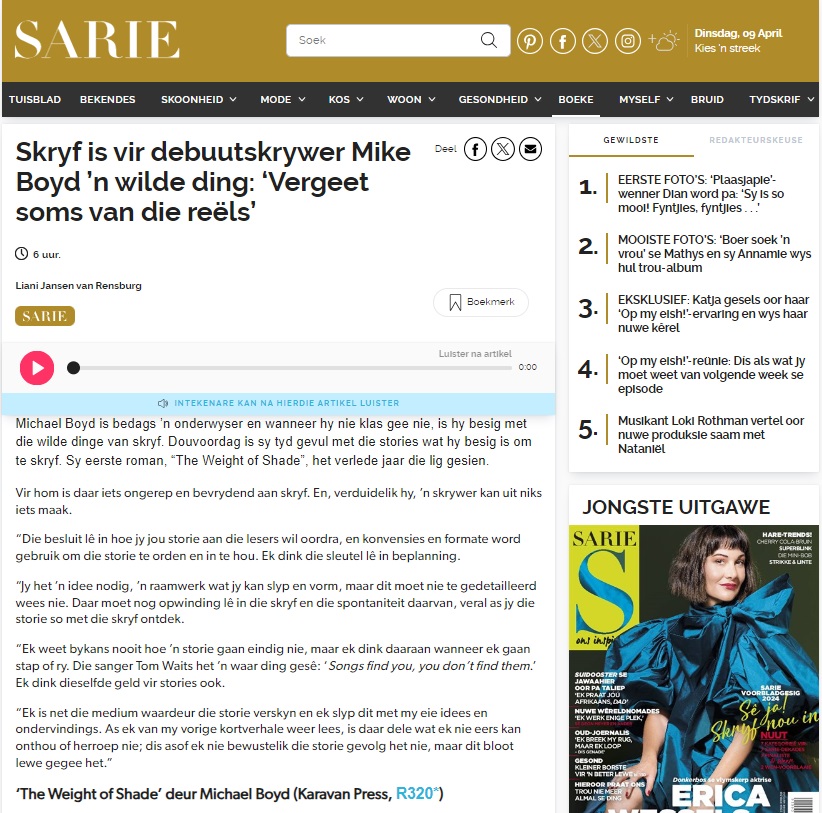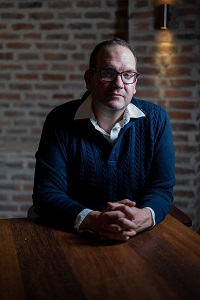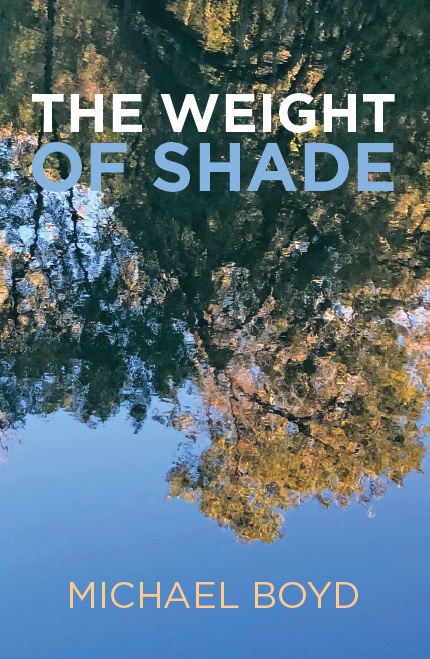
John Maytham speaks to Nick Clelland about his debut novel, Good Hope – the book is about an alternative present-day Cape Town that is the capital of a new independent country.

John Maytham speaks to Nick Clelland about his debut novel, Good Hope – the book is about an alternative present-day Cape Town that is the capital of a new independent country.

Read the full article and interview by Liani Jansen van Rensburg here:


“The Real Mystery of Everyday Stories” with Lester Walbrugh and Manuel Muñoz

PEN SA website: https://bit.ly/3PmyH3n
Spotify: https://spoti.fi/445a0g4
Apple: https://apple.co/3XmyLC6
Spotify for Podcasters: https://bit.ly/43SbmLj
Listen to the podcast here:
‘Melissa Volker found a way to obsess about surfing in any conditions – by obsessing about writing about surfing! A mid-life blooming writer and water woman from South Africa, Melissa’s delicious fiction blends “surf noir” with “environmental romance suspense.” (Check out the addictive Shadow Flicker!) In our pod, we chat about the coastal topography and bathymetry of South Africa’s breaks (get out your pencils) and she indulges my obsession with South African sharks. (Did you know you can get a gig as a Shark Spotter in Cape Town?) The South African waters are wild and intimidating, and though she grew up learning to paddle on flat water in an estuary, the ocean felt menacing to her well into her 40s. She still considers herself one of the most frightened surfers in her lineup, but she has braved sharks, orcas (!!!) and kilometers of open water on paddleboards, SUP’s and longboards. She credits a community group focused on supporting women for getting her off the beach and into the lineup. She also finds inspiration, and courage, in books and courses on surfing, the ocean, and, yes, sharks. Recognizing how her own life has transformed from surfing, feeling “older, but stronger, happier, braver, and stoked” she created Saltwater Sisters with her BFF to share their love and stoke and to empower other women to experience the joy they have found themselves. Melissa wraps up with one of my fave pieces of advice so far: “Get to know the ocean, because not every day is your day.”’
Dropping In to Power


To close the WZ Book Club year of 2022, the readers went down to the sea, to Beach Blanc Cafe next to the lighthouse on Woodbridge Island to hear the story of The Skipper’s Daughter by Woman Zone founder Nancy Richards and published by Karavan Press. Nancy was in conversation with artist Kim Gurney, the author of a book called Panya Routes. Listen here for some salty tales!


This Sunday, the wonderful Shafinaaz Hassim is interviewing Joanne Hichens about her memoir, Death and the After Parties.

Last night at Exclusive Books Cavendish: a beautiful evening of poetry and celebration. Melissa was in conversation with Jacques Coetzee. Their exchanges about the craft of poetry were inspiring, and Melissa’s reading of her poetry moved all the hearts present.
Thank you to Melissa, Jacques, Linda and the team at EB Cavendish, and all poetry lovers who attended.
A while back, Jacques also interviewed Melissa for AVBOB Poetry. If you missed the launch of Slaughterhouse, please read the interview below.














Jacques Coetzee – Ingrid Jonker, Olive Schreiner & AVBOB Poetry prize winner and author of An Illuminated Darkness (uHlanga Press, 2020) – interviews Melissa Sussens about her debut collection, Slaughterhouse.
JC: Judging from its title, the catalyst for the poems in your upcoming collection was the year you spent working at a slaughterhouse as part of your compulsory community service after qualifying as a veterinarian. Did you consciously set out to complete a body of work in order to deal with this trauma, or did you slowly realise over time that this was what you were doing?
MS: Writing about the slaughterhouse began with the poem which ended up as one of the winners of the 2020 New Contrast National Poetry Prize. Writing that poem unlocked something for me and I realised that I could write about these niche, specific experiences in a way that could be related to a universal human experience. I think I needed to write about that time in order to process it, but I didn’t expect to get a book out of it.
JC: One of the most striking qualities in your work is its ability to tell stories. Was storytelling an important part of your life growing up? Is this something you think about while writing, or does it come naturally to you?
MS: I have always loved reading and living myself into stories. Discovering that poems could tell stories the way longer pieces of writing do was a magical realisation for me. I want to be a storyteller first. I hope my poems connect with people in ways that are understandable and grounded. I don’t want readers to leave my work feeling they “don’t get it” or that my poems only exist in the clouds.
JC: How did poetry enter your life? Do you remember a particular moment when you knew that poetry was something you wanted to pursue seriously?
MS: My earliest memory of writing poetry was creating rhyming treasure hunt clues as a kid for my younger brother’s birthday party. My first taste of being a “published poet” was as a young teen when I had a few poems published in Teen Zone magazine. As a student I sought out that feeling of connection again and started sharing my writing with friends and then at open mic events (shoutout to Spoken Sessions in Pretoria). But it was only after doing a poetry writing and editing course with American poet, Megan Falley (Poems That Don’t Suck) back in 2018 that I started taking my writing, and more importantly my editing, more seriously.
JC: Another aspect of your work that fascinates me is the attention it pays to form. I am thinking, for instance, of your pantoum about gender-based violence in South Africa, of Slaughterhouse Sestina and Euthanasia Pantoum. Do you enjoy working with difficult forms for their own sake, or is this also partly a way to focus or contain powerful emotions?
MS: I love using forms as tools to unlock my writing. They feel like puzzles to me, especially the sestina, and I love the challenge that provides. I also find it interesting how sometimes a form can allow me to find an angle that I wouldn’t have otherwise found if I was writing free verse.
JC: You write movingly about your work as a vet, risking territory where many writers would become sentimental or cute. I suspect that the success of these poems has something to do with your taking up of alternative personae, like the euthanasia syringe used to dispatch pets who can no longer be treated.
MS: I find persona-type poems very freeing. In writing them I am able to explore or express things in a way that I wouldn’t if I was writing in my own voice. I think they allow me to better imagine a situation from another angle. I am constantly searching for humanity, for connection through my writing.
JC: How easy is it to move between your work as a vet and the space in which your poems arrive?
MS: It varies. When I have a poem prompt or idea in my head I can spend my time at work playing with it in my thoughts or finding inspiration from incidents in my vet life that I can write about. But there are also times when I struggle to switch off my job mindset and focus on my more creative side. I would say I am generally quite elastic though. I spend most of my lunch hours on poetry – writing, editing or reading poems in the middle of my workday.
JC: Slaughterhouse contains piercingly beautiful poems of heartbreak, of innocence lost and regained, and ultimately about domestic happiness. Would you like to say something about the way poetry has helped you to maintain emotional well-being during difficult times? Do you think poetry can provide a kind of exorcism, or be a kind of talisman to help us navigate particularly challenging emotional terrain?
MS: Absolutely. I have experienced loneliness intensely throughout my life. For me poetry is a reminder that I am not alone, a way to connect the outside world with my internal one. Poetry is essential in my emotional processing, both in my personal life and in the hard aspects of my work. By writing these poems I can exorcise some of the negative emotions that would otherwise weigh me down.
JC: Perhaps surprisingly for a collection called Slaughterhouse, one of the greatest pleasures your poems afford is their flashes of humour. I am thinking of poems like The Drive and Blue, which seem to signal tormentedness but are really (for lack of a better word) tragicomic. Does this ring true? Is this quality in your work recognised enough, or do readers tend to miss it?
MS: Thank you so much for saying this! I have tried to bring some dark humour (I love tragicomic as a description of it) to my poems. I don’t think this is something that is recognised by most people. I think I mostly come across as a very serious person, and my poems probably do too. But I absolutely want people to find the humour or lightness within this collection too, to be able to laugh at life’s ironies alongside me.

Artist, academic, writer Kim Gurney visited five different Independent Art Spaces in five different African cities: Nairobi, Accra, Addis Ababa, Cairo and Dar es Salaam. She came back with a changed mind, fresh thinking and some very different outlooks on the future, of art, cities and society in general. The result, a book to change your mind too, called Panya Routes (Motto).
Listen to her interview with Nancy Richards: KIM GURNEY – On ‘Panya Routes’
The latest issue of the Johannesburg Review of Books features an excerpt from Lester Walbrugh’s debut novel Elton Baatjies and an interview with Joy Watson.



